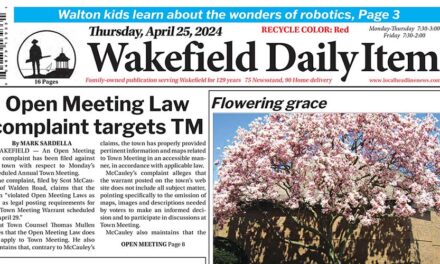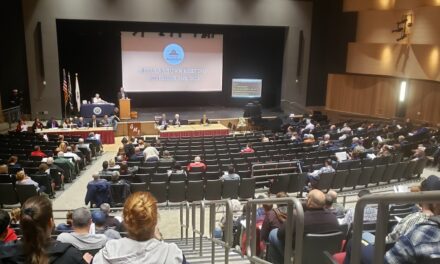Published in the December 27, 2016 edition
WAKEFIELD — Superintendent David DiBarri announced that the Northeast Metropolitan Regional Technical Vocational High School hosted a legislative breakfast last week to discuss plans for the construction of a new building. Massachusetts Speaker of the House Robert DeLeo and House Minority Leader State Rep. Bradley Jones, who were in attendance, voiced their support for the project.
Northeast Metro Tech, located at 100 Hemlock Rd. in Wakefield, is operating out of a more than 50-year-old building that requires modernization to meet the demands of a 21st century economy.
To create a facility that incorporates educational, capital and maintenance improvements, Superintendent DiBarri welcomed legislators and other local officials to the school on Wednesday, Dec. 21 to learn about the construction plans and the fiscal impact it would have on member communities.
State and local officials from the school’s district who attended the event included: State Sen. Jason Lewis, State Rep. Paul Brodeur, State Rep. James Dwyer, State Rep. Donald Wong, Chelsea City Manager Thomas Ambrosino, Malden Mayor Gary Christenson, North Reading Town Manager Michael Gilleberto, Stoneham Town Administrator Thomas Younger and Wakefield Town Administrator Stephen Maio.
“I want to thank Speaker of the House DeLeo and House Minority Leader Bradley Jones, along with our local leaders for taking the time to attend this informative meeting on the future of our school and vocational technical learning,” Superintendent DiBarri said. “It is our hope that we will receive support from our partners in the Legislature and district communities to create a building that exemplifies 21st century learning demands for our students.”
The project, which began in 2015 with a feasibility assessment by Dore and Whittier, will take approximately 6 1/2 to 7 1/2 years to complete and cost approximately $200 million.
Jason Boone, Educational Consultant from Dore and Whittier, told attendants at the breakfast that during the review of the building, several physical and educational needs were identified. This includes a complete replacement of all mechanical systems and electrical systems, along with a full code and regulations update. Additionally, the building’s areas require modernization to comply with state regulations in terms of size and program demands. The school is in need of more special education accommodations and better designated public meeting areas.
Following the feasibility study, Northeast Metro Tech applied to the Massachusetts School Building Authority (MSBA) — a state agency that works with communities to support educationally-appropriate, flexible, sustainable and cost-effective public school facilities — for an eligible 71.84 percent reimbursement grant to design and construct a reconstructed or new facility.
Northeast Metro Tech will learn if it received an invitation from the MSBA in February. If approved, the MSBA would fund a $200 million project, with approximately $144 million in state aid support, requiring approximately $56 million to be paid by the cities and towns in the school district – mortgaged over a 30 year period. Local cost would be divided among communities based on the prior year Oct. 1 enrollment – as agreed to in the district’s charter.
For the project to receive the go-ahead, state funding is critical. The Northeast School Committee would then seek support from all 12 member communities.
“We in the Legislature realize the importance that vocational technical schools have not only in children’s lives, but in the economy of the Commonwealth,” Speaker DeLeo said. “One of the things we’ve tried to put emphasis on is vocational technical learning — this is a place where we need to get jobs out of.”




